Another year has gone by, and football continues to live up to its reputation as the ‘Beautiful Game’. Here is what 2024 gave us in the world of football.
Winds of change
Indian football reached a nadir in 2024 when the men’s national team failed to win a single game in a calendar year — its first such failure in 16 years (having played at least five games).
The Blue Tigers started the year riding on the optimism of winning three trophies the previous year as it built momentum towards the AFC Asian Cup.
What unfolded afterwards was a shock for thousands of Indian fans in Qatar as their side lost all three group-stage games, failed to score a single goal, and made an early exit from the tournament.
India’s captain, Sunil Chhetri, shed a tear or two after the final game, a 0-1 loss to Syria, but the nightmare had just begun. The team lost 1-2 to Afghanistan, a side ranked 41 spots below India — another first on home soil.
A draw with Kuwait at home follwed by a loss to Qatar, marred by controversy, ended India’s flickering hopes of securing a spot in the third round of the FIFA World Cup 2026 qualifiers for the first time.
Au revoir: Sunil Chhetri thanks fans after his final game for India, against Kuwait in the FIFA World Cup 2026 Qualifier at the Salt Lake Stadium in Kolkata.
| Photo Credit:
RV Moorthy/The Hindu
Au revoir: Sunil Chhetri thanks fans after his final game for India, against Kuwait in the FIFA World Cup 2026 Qualifier at the Salt Lake Stadium in Kolkata.
| Photo Credit:
RV Moorthy/The Hindu
In 2023, India had won the Tri-Nations tournament, the Intercontinental Cup, and the SAFF Championship, eventually rising into the top 100 of the FIFA rankings after five years.
But 2024 felt like reading Norwegian Wood just after The Alchemist — a sense of perpetual gloom devoid of any hope of light. Upsets in Indian football were not an aberration. They were the norm.
ALSO READ: Early blossom, Chhetri retirement and a controversial goal: Only agony for India as it bites the dust in FIFA World Cup qualifiers
The draw with Kuwait also brought the curtains down on the illustrious career of Chhetri, one of India’s greatest-ever footballers with the highest number of goals from the country.
Within weeks, Igor Stimac, the head coach, was shown the door, and Manolo Marquez, the Spanish coach who guided Hyderabad FC to the Indian Super League title in 2022, took over.
Though results continued to be poor, glimpses of hope arrived from new players like Jithin MS, Edmund Lalrindika, Irfan Yadwad, David Lalhlansanga, Vibin Mohanan, and a resurgent Farukh Choudhary.
Farukh made his national team comeback after 1,099 days and scored on his return, a crucial equaliser against Vietnam in Marquez’s first away match in charge.
In a post-Chhetri era, what awaits India in 2025 are the Asian Cup qualifiers starting in March, with the most important match being against Hong Kong, China.
Hong Kong is coached by Ashley Westwood, who knows Indian footballers well and guided a depleted Afghan side to triumph over India last year.
Drawn with Hong Kong, Bangladesh, and Singapore, India will need to finish as group-toppers in the third qualifying round to seal a spot in the next edition of the continental tournament in Saudi Arabia.
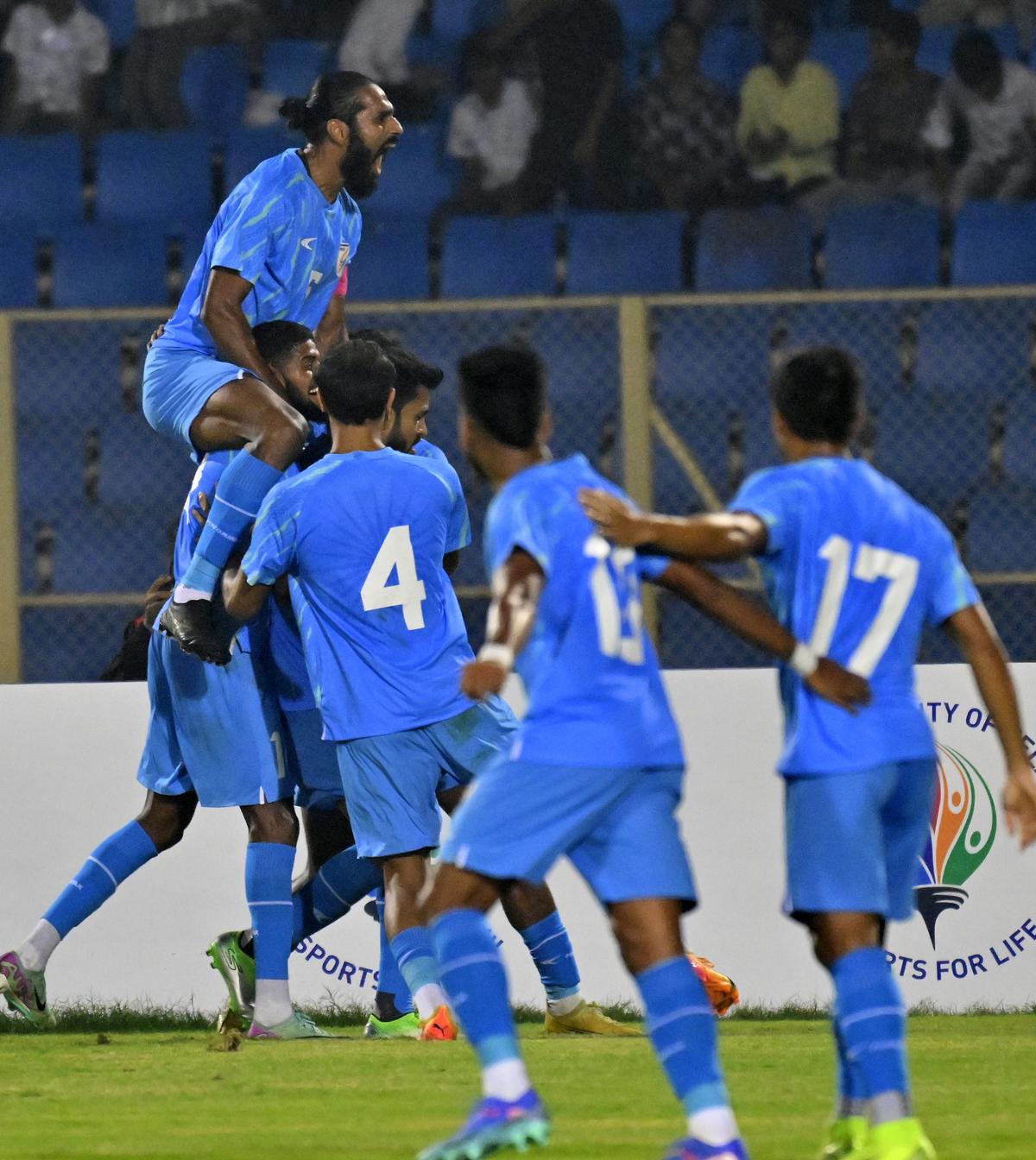
Finishing off on a high: India players celebrate their last goal of 2024, an equaliser against Malaysia at the GMC Balayogi Athletic Stadium in Hyderabad.
| Photo Credit:
Nagara Gopal / The Hindu
Finishing off on a high: India players celebrate their last goal of 2024, an equaliser against Malaysia at the GMC Balayogi Athletic Stadium in Hyderabad.
| Photo Credit:
Nagara Gopal / The Hindu
There were changes in women’s football too, with Santosh Kashyap succeeding Langam Chaoba Devi as the full-time head coach.
Under the former Aizawl and Salgaocar FC head coach, the Blue Tigresses reached the semifinals of the SAFF Women’s Championship but lost 2-4 on penalties to host Nepal.
In December, Joakim Alexandersson — another Swede after Thomas Dennerby — joined the hierarchy of women’s team coaches. While he currently manages the under-20 and under-17 sides, he will be a potential candidate to take over from Kashyap in 2025.
European top-flight
Dubbed as the ‘toughest league in Europe’, the usual script played out in England, where Manchester City reigned supreme and successfully defended the Premier League title.
In doing so, it became the first side to win four titles on the trot. While the club received plaudits for this unprecedented feat, it also garnered attention for all the wrong reasons due to the 115 charges of Premier League rule breaches, a major talking point in the footballing world.
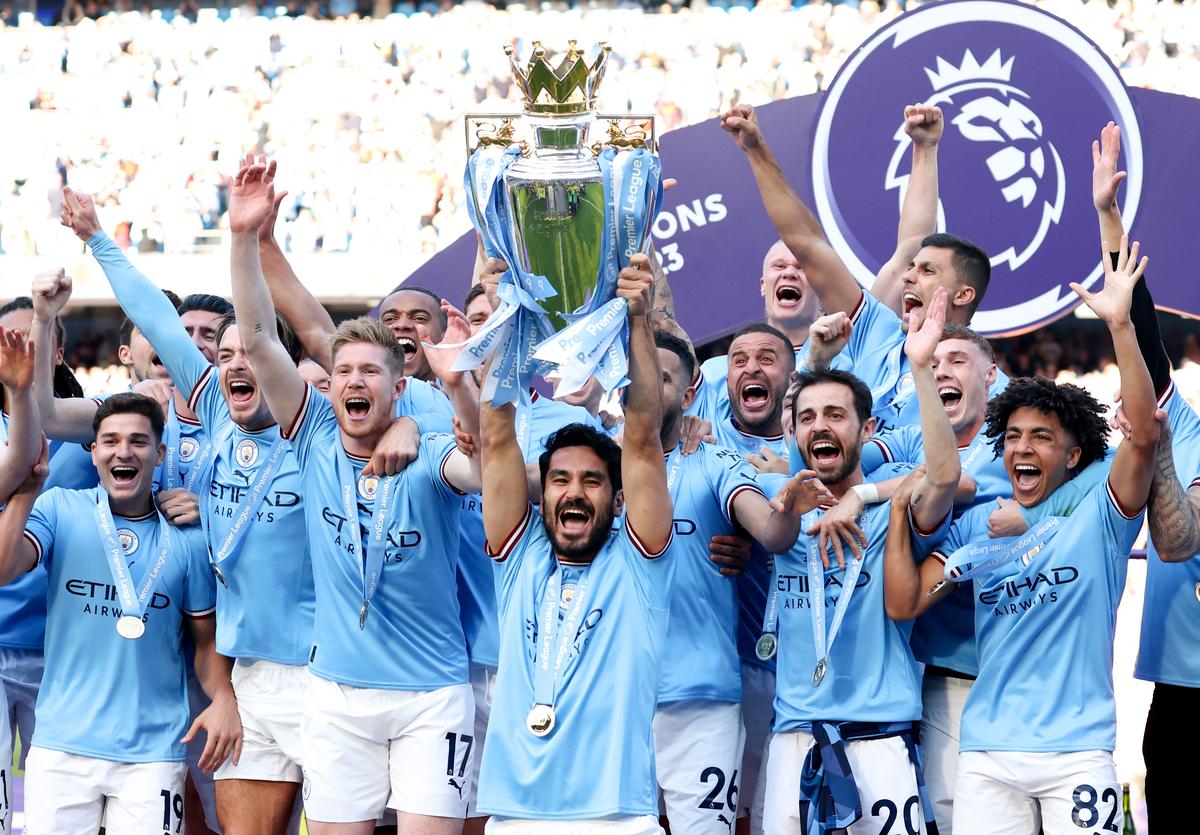
Ruthless: Manchester City became the first side to win four Premier League titles on the trot.
| Photo Credit:
Getty Images
Ruthless: Manchester City became the first side to win four Premier League titles on the trot.
| Photo Credit:
Getty Images
According to the latest reports, the hearing for all the charges has concluded, and the number has risen to 130. The verdict is expected sometime in 2025, though no exact timeline has been conveyed.
Real Madrid grabbed the honours in Spanish top-flight football. Carlo Ancelotti’s men cemented their authority and won La Liga with 95 points — 10 more than arch-rival Barcelona, which endured a tumultuous season owing to financial difficulties and changes in the dugout.
Germany saw the rise of a new force under legendary midfielder Xabi Alonso, who guided Bayer Leverkusen to its first Bundesliga title, breaking Bayern Munich’s 11-year reign.
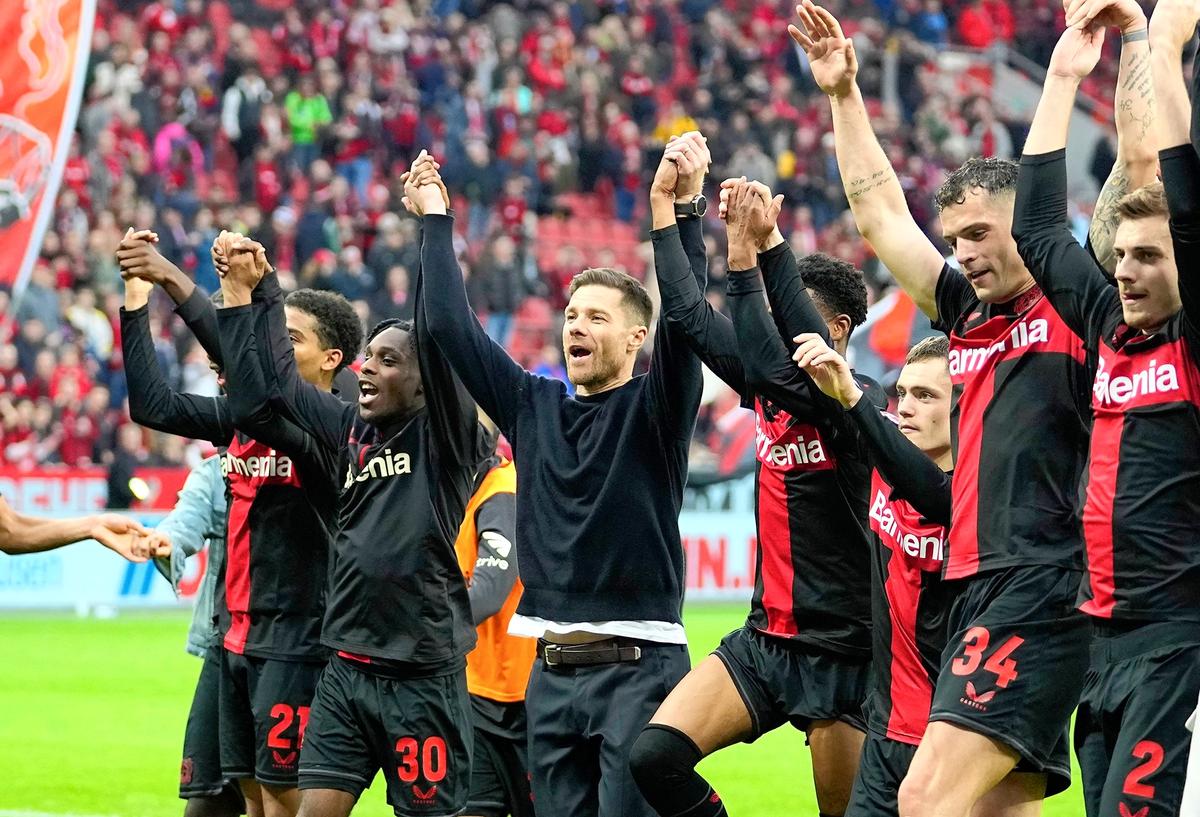
The perfect underdog story: Leverkusen’s head coach Xabi Alonso, centre, celebrates with his team after winning the German Bundesliga title.
| Photo Credit:
AP
The perfect underdog story: Leverkusen’s head coach Xabi Alonso, centre, celebrates with his team after winning the German Bundesliga title.
| Photo Credit:
AP
Alonso’s men not only won the league but did so with utter dominance, remaining undefeated throughout the season. In 34 matches, Leverkusen won 28 and drew six, finishing with 90 points.
Serie A saw the age-old rivals Inter Milan and AC Milan battle for the Scudetto. In the end, it was the blue side of Milan that prevailed, with Inter clinching the title with 94 points, 19 more than runner-up AC Milan.
Since PSG was injected with Qatari investment, the French top-flight has hardly seen a change in narrative. The 2023-24 season was no different as the Paris-based club cruised to the title, finishing nine points ahead of second-placed Monaco.
However, it was a bittersweet season for PSG, having lost Kylian Mbappe to Real Madrid in a transfer marred by a public fallout over pending salary payments.
In the UEFA Champions League, Real Madrid won a record-extending 15th title (right), beating Borussia Dortmund in the final, reaffirming its dominance as the undisputed king of Europe.
In the Women’s Champions League, Barcelona defended its title by beating Lyon 2-0 in the final, taking its overall tally to three.
Spanish dominance and the Albiceleste fairytale
The year 2024 saw two major international tournaments — the European Championships and the Copa America.
In the Euros, new manager Luis de la Fuente guided Spain to its third title. Displaying a brand of flamboyant yet direct football — quite unlike the Luis Enrique era that was criticised for its ‘possession-without-result’ approach — Spain beat England 2-1 in the final. The Three Lions’ wait for a major men’s international title since 1966 continued.
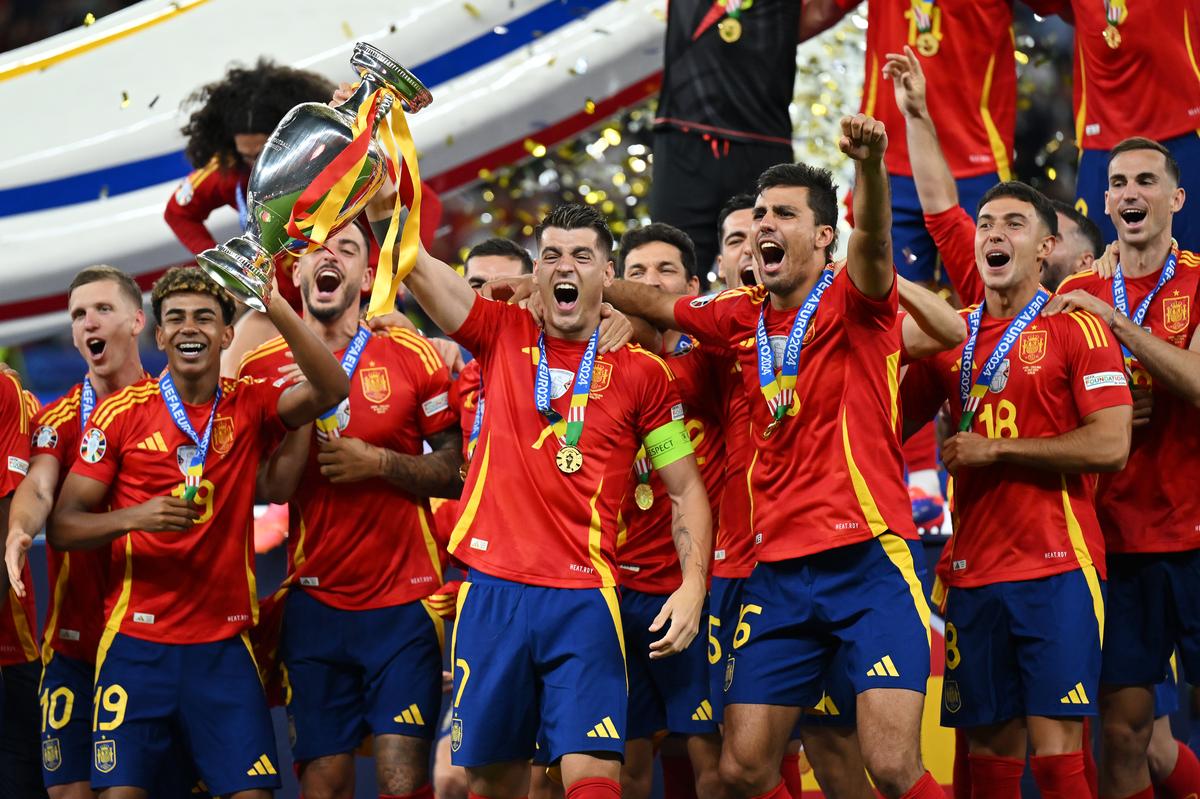
A bright future: Spain, featuring young sensation Lamine Yamal (No. 19) and Ballon d’Or winner Rodri (third from right), won the Euros after beating England 2-1 in the final.
| Photo Credit:
Getty Images
A bright future: Spain, featuring young sensation Lamine Yamal (No. 19) and Ballon d’Or winner Rodri (third from right), won the Euros after beating England 2-1 in the final.
| Photo Credit:
Getty Images
Spain unearthed a new star in La Masia product Lamine Yamal, who, at just 17, was a key player in the forward line.
With one goal and four assists, he won the Young Player of the Tournament Award and became the youngest player to score in the Euros and win the title.
In South America, Lionel Scaloni’s Argentina continued its dominance, defending its Copa América title and emulating Spain’s feat of winning three major international tournaments on the trot.
RELATED: Argentina beats Colombia to lift record 16th Copa America title
Facing a rejuvenated Colombia in the final, boosted by James Rodriguez’s form, Argentina toiled before Lautaro Martinez scored the decisive goal in the 112th minute.
Martinez finished as the tournament’s top scorer with five goals, while Emiliano Martinez was named Best Goalkeeper. James won the Best Player Award.
Individual brilliance
After an exceptional season with Manchester City and Spain, Rodri won the Ballon d’Or for the best men’s player of the year.
Aitana Bonmati of Barcelona claimed the women’s player of the year award for the second consecutive year.
Carlo Ancelotti and Emma Hayes won the men’s and women’s coaches of the year awards.
Vinicius Jr, despite missing out on the Ballon d’Or, was recognised with FIFA’s Men’s Player of the Year Award after winning La Liga and the Champions League with Real Madrid. Bonmati won the women’s award, while Ancelotti and Hayes were named the best coaches.
A tale of contrasts
For Lionel Messi, 2024 was a gratifying year. After leading Argentina to Copa America glory, he also captained Inter Miami to its first-ever MLS Supporters’ Shield with a record 74 points. The victory secured his record-extending 46th career trophy.

Lionel Messi
| Photo Credit:
Getty Images
Lionel Messi
| Photo Credit:
Getty Images
For Cristiano Ronaldo, the wait for a Saudi Pro League title continued as Al Nassr lost to arch-rival Al Hilal, which won the league by 14 points.
However, Ronaldo achieved another milestone, scoring his 900th career goal in a Nations League match against Croatia, which Portugal won 2-1.
In 2025
Apart from the usual club football and international fixtures, the biggest event in the 2025 footballing calendar has to be the FIFA Club World Cup, where Manchester City is the defending champion.
Scheduled to be played in the United States from June 14 to July 23, the tournament, which has undergone a major revamp, will now feature 32 teams, including the winners of the four previous continental championships.
Clubs under UEFA have 12 slots, CONMEBOL clubs have six, and four slots each have been allotted for CAF, CONCACAF, and AFC clubs. Host country USA will be represented by Lionel Messi’s Inter Miami, which won the MLS Supporters’ Shield.
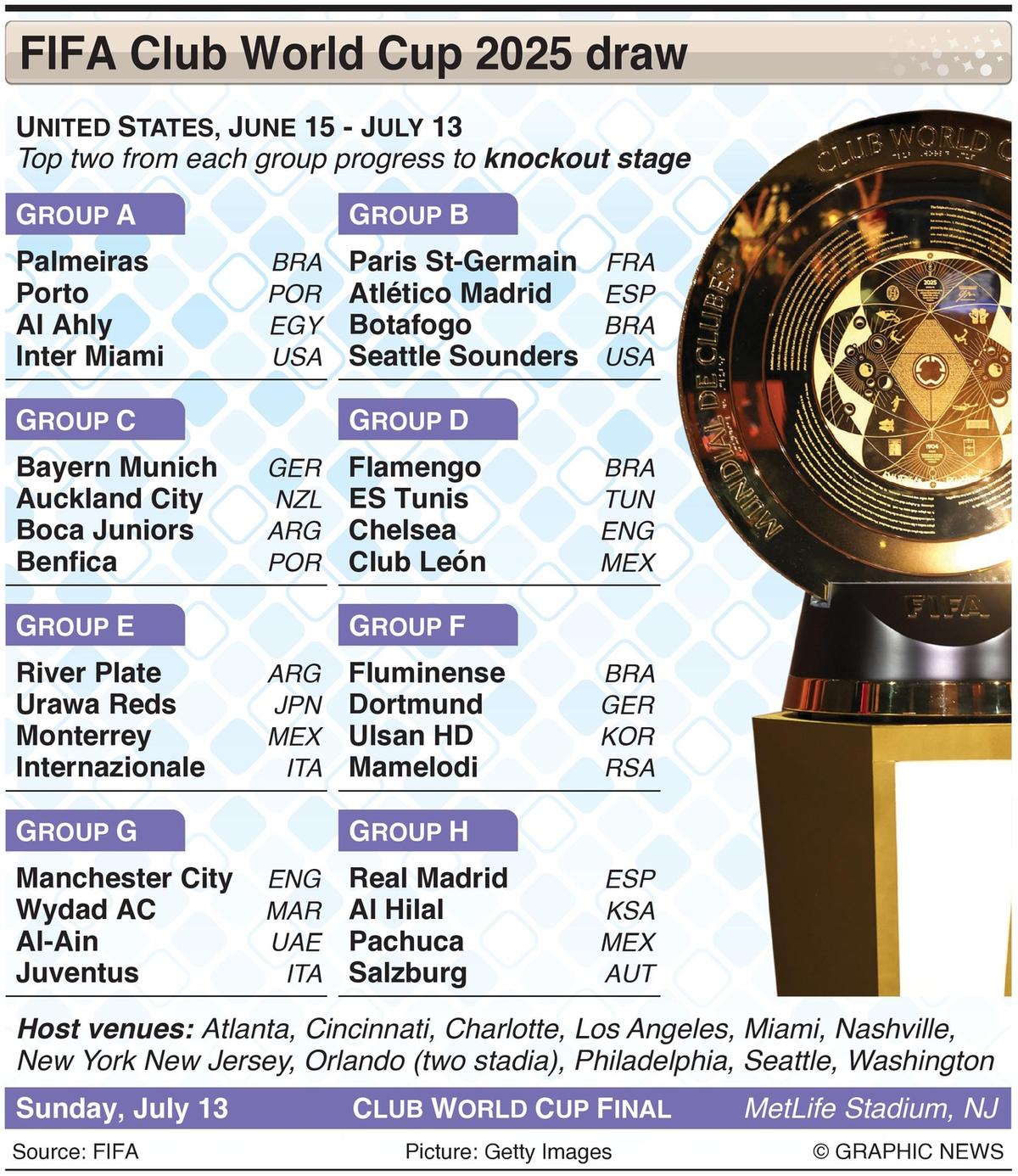
There’s also the impending verdict on Manchester City’s Premier League rule breaches. While there has been no official confirmation, reports suggest that, if found guilty, punishments could be as harsh as City being stripped of its titles and being relegated to the second division. It remains to be seen what unfolds in this long-drawn saga.
Apart from the usual club competitions, 2025 is a significant year for women’s international football. England will defend its European Championship title starting in July. The CAF Women’s Africa Cup of Nations (AFCON) and CONMEBOL Copa América Femenina are also scheduled for 2025.
The Men’s AFCON will commence in December, while the FIFA U-20 World Cup is also scheduled to take place between September and October.
Look out for
Irfan Yadwad
The Goa-born player (in blue) began his Indian top-flight journey in the 2023-24 season but remained a relatively unknown figure. However, in the ongoing 2024-25 season, he has grabbed the spotlight.
Playing for Chennaiyin FC, Yadwad has registered three goals and two assists in 14 appearances. His brilliant form earned him his maiden national team call-up, and he made his India debut in an international friendly against Malaysia.
Finding the net in style: Irfan Yadwad of Chennaiyin FC celebrates scoring a goal against Bengaluru FC in the Indian Super League, at the Jawaharlal Nehru Stadium in Chennai.
| Photo Credit:
FSDL/ISL Media
Finding the net in style: Irfan Yadwad of Chennaiyin FC celebrates scoring a goal against Bengaluru FC in the Indian Super League, at the Jawaharlal Nehru Stadium in Chennai.
| Photo Credit:
FSDL/ISL Media
Standing at 6ft, Irfan’s blistering pace and versatility in the forward line make him an asset for coaches. His speed and a penchant for making excellent runs behind the defence — all crucial qualities in an attacker. In terms of creativity, he also demonstrates an ability to deliver incisive passes.
With the Indian football team’s forward line desperately craving quality players, Irfan has the potential to become the next big thing in Indian football and cement a permanent place in the Blue Tigers’ starting XI.






